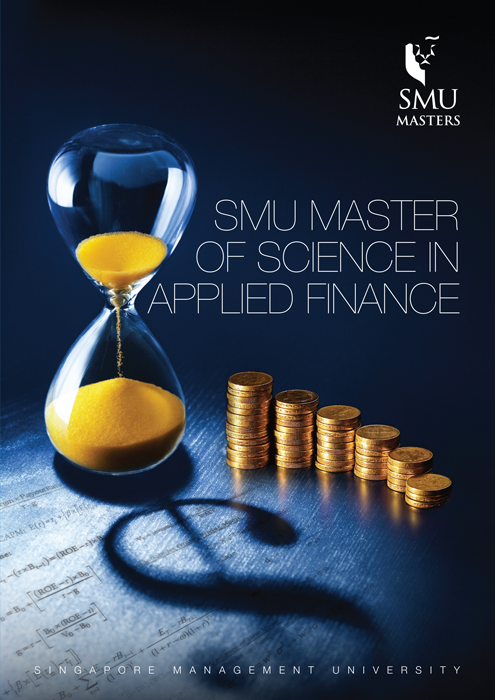
Professor Benedict Koh (Associate Dean of Postgraduate Finance Programmes at Singapore Management University) has a clear vision for the future of Singapore as a leading global financial centre and a magnet for financial talent.
“The skills needed to succeed in finance are rapidly changing because of technology, and Singapore is increasingly competing with other finance hubs for market share. We can’t be complacent,” says Professor Koh. “We must act now to train and retrain our workforce so that the finance sector continues to support our economy and connects us to global markets.”
Singapore Management University (SMU) was recently appointed by the Monetary Authority of Singapore (MAS) and the Ministry of Manpower – Singapore’s central bank and department of labour respectively – to spearhead a government training initiative, SkillsFuture, across all areas of financial services, including wealth management, fund management and risk management.
“We have a wide range of programmes to prepare Singaporeans for a more technology-driven environment in the design, delivery and governance of financial services,” says Professor Koh. SMU, for example, runs several short courses – from compliance to blockchain – focused on the digital economy, and it has developed finance leadership programmes for more senior professionals.
If you want even deeper insights into the future of financial services, SMU also offers three world-class Masters degrees: MSc in Wealth Management (MWM), MSc in Applied Finance (MAF), and MSc in Quantitative Finance (MQF). MWM focuses on private banking and asset management, MAF concentrates on fund management, and MQF grooms talent in risk management.
The importance of these three sectors to Singapore’s status as a dynamic financial centre was reinforced in October 2017 when MAS highlighted them as key to its Financial Services Transformation Map, a new government blueprint for future growth.
“The three SMU Masters programmes are unique because they’re specialised, meant to equip one with current and specific skills in fast-growing areas of the finance sector,” says Professor Koh. “They’re designed both for current finance professionals who want to advance their knowledge, and for those outside the sector who want to move into finance.”
Career changes
Empowering people to make career changes is a crucial aspect of SMU’s collaboration with MAS. “There have been retrenchments in some areas of finance and further disruption is on the horizon. We’re preparing for this by offering programmes that retrain you into areas where opportunities are increasing,” says Professor Koh.
Wealth management is one of these fields. “There’s a lot of money coming into Singapore thanks to the growth of private wealth in the region. But there’s not enough talent in private banking and firms are raiding each other’s teams, which isn’t sustainable.”
The SMU MSc in Wealth Management, which is Asia’s only full-time wealth management programme and is ranked third globally (2017 FT Masters in Finance Post Experience Ranking), is helping to tackle these talent shortages. “It teaches aspiring and seasoned wealth managers the full range of hard and soft skills, from financial planning, tax regimes and business trust, to networking and relationship building,” says Professor Koh.
Like the MWM, the MSc in Quantitative Finance (MQF) is 12-months, full-time, and provides participants with technical expertise that is becoming increasingly sought after by employers in Asia. Straddling finance, statistics, computer science and financial mathematics, it is a launchpad for careers in risk management and related functions such as derivative pricing and algorithmic trading.
“More risk management jobs have opened up in recent years in Asia and this trend looks set to continue,” explains Professor Koh. “The MQF at SMU allows you to comprehend the risks and complexities of the financial markets. It gives you the tools to be successful in this expanding sector.”
Building an ecosystem
The fund management industry in Singapore is also earmarked for growth by MAS. “The Financial Services Transformation Map sets out to build Singapore as a fund hub, like what we’ve already done for shipping and aviation. While we have an advantageous tax regime here to attract funds, we must do more in the face of competition from other APAC cities, such as Tokyo, Hong Kong, Shanghai and Sydney,” says Professor Koh.
Singapore is now aiming to create a broader “ecosystem”, he adds. “The larger fund houses want everything based in one country. Singapore is well-established in equity and bonds, so MAS is now trying to create a critical mass in private equity and alternative investments like commodities.”
It’s also vital that Singapore has a strong enough talent pool to support the fund management firms recruiting locally, says Professor Koh. The SMU MSc in Applied Finance (MAF), which is offered in both 12-month full-time and 18-month part-time formats, is designed to help Singapore stay competitive in the sector and to provide aspiring and experienced professionals with cutting-edge skills.
Fintech future
The MAF, MQF and MWM are regularly updated to meet the career needs of finance professionals. From 2018, SMU is adding a fintech elective option (co-taught by staff from SMU’s Lee Kong Chian School of Business and School of Information Systems) for all three programmes. As part of SkillsFuture, the course is also open to members of the public at government-subsidised rates.
“Technology will make some finance jobs redundant, especially in the back-office. We’re already seeing this with payments systems being outsourced and blockchain being used to automate trade finance documentation,” says Professor Koh. “On the other hand, to take advantage of fintech developments, financial institutions need to hire more people who are conversant in both finance and technology.”
The SMU fintech module will help with one of the main objectives of the Financial Services Transformation Map: retraining people to work in fintech. “There’s a huge skill shortage in fintech in Singapore, so boosting your knowledge in this area will give you an advantage in the job market,” says Professor Koh.
The course is aimed at people who want to launch their own company and those who want to move into a technology role at a bank. And it covers the technical essentials (including big data, cyber security, coding and blockchain) as well as the challenges of running a profitable fintech business.
Unique teaching
All modules within the three SMU postgraduate finance programmes are taught by senior SMU academic faculty, many of whom boast industry experience. “This allows us to deal with a wide variety of real-life problems that the textbooks don’t cover. And we can provide practical advice on how to handle these issues,” says Professor Koh, who used to work for J.P. Morgan Chase.
SMU also invites current finance industry practitioners – from banks and hedge funds, for example – into the classroom. “They’re domain experts who can tell you exactly what’s going on in the financial markets now. They bring state-of-the-art techniques and industry best practices into the classroom.”
Professor Koh describes the teaching style at SMU as “a discussion rather than a lecture”. “We encourage students to exchange different viewpoints with each other and the professor. You have to think on your feet, defend your ideas and accept criticism, just like you do at work.”
SMU curriculums are carefully designed to provide participants with comprehensive knowledge of their specialist areas: wealth management, fund management or risk management. “For example, we frequently discuss case studies of real companies in Asia and worldwide, so you see how the theory applies on-the-job,” says Professor Koh.
Providing this kind of career-focused training is an important goal of SMU to help Singapore develop the talent needed to consolidate its position as a leading global financial centre in Asia, he adds. “Our programmes will provide the necessary solid analytical tools, knowledge and perspectives you need to accelerate your career and be part of the transformation of financial services in Singapore.”
This article was originally published on eFinancialCareers.
Speak to our Admissions Advisors
Lee Kong Chian School of Business
Postgraduate Admissions
Singapore Management University
Lee Kong Chian School of Business
Graduate Programmes Office, Level 4
50 Stamford Road, Singapore 178899
Tel: +65 6828 0882
Join us at the upcoming events
Ayana Midplaza Jakarta
Jl. Jenderal Sudirman No.Kav 10-11, RT.10/RW.11, Karet Tengsin, Kecamatan Tanah Abang, Kota Jakarta Pusat, Daerah Khusus Ibukota
Jakarta 10220, Indonesia
189 Sukhumvit Road Soi 13-15, Klongtoey Nua, Wattana, 10110 Bangkok, Thailand
148 Tran Hung Dao Boulevard, District 1
700000 Ho Chi Minh City, Vietnam
